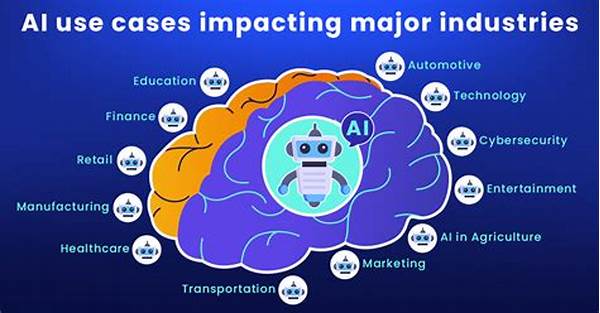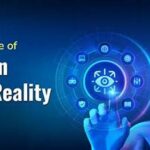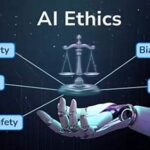Artificial Intelligence (AI) is transforming the landscape of numerous industries, redefining how businesses operate and engage with their customers. As the digital age pushes onward, companies are increasingly seeking innovative solutions that not only enhance efficiency but also provide them with a competitive edge. From detecting fraudulent transactions in banking to predicting maintenance needs in manufacturing, the adaptability and potential of AI seem almost limitless. This rise of AI is not just a trend; it’s a revolution. So, what are the best AI use cases across industries that are making headlines and capturing attention? Let’s dive into how different industries are harnessing the power of AI, employing it in ways that are both surprising and forward-thinking.
Read More : How Ai Impacts Global Job Markets In 2025
In healthcare, AI is proving to be a game-changer, tackling complex problems that were once considered insurmountable. Predictive analytics can now anticipate patient admissions and optimize resource allocation, while machine learning algorithms help in early diagnosis of diseases by analyzing patterns in medical imaging. These innovations not only save time and resources but can significantly improve patient outcomes, bringing a wave of positivity and efficiency to what can often be a deeply strained healthcare system. It’s no wonder that healthcare professionals are increasingly seeking AI solutions as a part of their practice arsenal.
Retail is another industry where AI’s impact is profound. Personalized shopping experiences, driven by AI algorithms that analyze consumer behavior, are enhancing customer satisfaction and loyalty. With virtual fitting rooms and chatbots providing 24/7 customer service, the shopping experience is being redefined, making it more engaging and tailored to individual needs. In the fiercely competitive world of retail, these AI use cases provide businesses with the tools they need to stand out and retain their customer base.
In the realm of manufacturing, AI is ushering in a new era of production efficiency and quality control. Predictive maintenance, powered by AI, minimizes downtime by predicting equipment failures, ensuring that factories run smoothly and effectively. Moreover, automation driven by AI algorithms can handle repetitive tasks with precision, increasing productivity and reducing human error. Whether it’s through robotic process automation or smart supply chain management, the best AI use cases across industries demonstrate AI’s capability to transform traditional manufacturing into a digital powerhouse.
Industries Transforming with AI
The financial services sector is not left behind; it’s reaping the benefits of AI by enhancing data security and customer interaction. Fraud detection systems use AI to identify unusual patterns earlier than traditional methods, safeguarding user data and maintaining trust. Additionally, AI-powered robo-advisors offer personalized investment advice, making financial planning more accessible to everyone. This synergy between AI and finance exemplifies how technology can foster trust and profitability in one fell swoop.
—
As we navigate through the digital era, AI stands out more as a necessity than luxury. Its versatility across various domains showcases the vast potential that AI technologies hold for business transformation. By improving operational efficiencies, driving innovation, and enhancing customer experiences, the best AI use cases across industries are setting new benchmarks for success.
One of the standout features of AI is its ability to handle and process large volumes of data. In the data-rich world of today, industries rely on robust data analysis to garner insights for strategic decision-making. Industries such as marketing leverage AI-driven insights to craft targeted campaigns that resonate with their audience, blending creativity with technology for improved ROI. This blend of art and science is crafting stories that engage customers in ways that were formerly unimaginable.
AI is also instrumental in promoting eco-friendly practices. In agriculture, for instance, AI solutions optimize water usage, monitor crop health, and automate harvesting processes. These technologies not only enhance productivity but also support sustainable farming practices, reflecting a responsible approach towards environmental conservation. As the demand for sustainable solutions intensifies, AI-driven approaches serve as a beacon of hope for industries striving to minimize their ecological footprint.
Education, too, is witnessing a renaissance with AI at the helm. Providing personalized learning experiences, AI tutors adapt to individual student needs, encouraging progress at their own pace. This tailored approach transforms the traditional classroom into a dynamic, interactive learning environment, addressing diverse learning styles and needs. Moreover, AI-powered tools are assisting educators with administrative tasks, freeing up their time to focus on nurturing student potential and creativity.
AI Unleashing New Possibilities
The Future of AI Application
Research and development in AI continue to flourish, unearthing innovative solutions that redefine traditional industry paradigms. From autonomous vehicles to AI-driven content creation, the possibilities are seemingly endless. A significant draw of AI lies in its ability to continually learn and adapt, informing future iterations of technology and spurring perpetual improvement.
The integration of AI into industry operations not only propels operational efficiency but also cultivates an environment where both human and technological resources complement each other. In banking, for instance, AI systems streamline back-office processes, improving speed and accuracy while minimizing human intervention. This enables professionals to focus on relationship management and strategic initiatives, crafting a customer-centric approach that prioritizes trust and reliability.
Customer service is another vertical where AI shines brightly. Virtual assistants and chatbots, powered by natural language processing, offer instant, round-the-clock support. In industries such as telecom, this minimizes wait times and enhances customer satisfaction, reflecting an agile, responsive service model that aligns with today’s fast-paced expectations. The pragmatic application of AI ensures that businesses remain nimble and customer-oriented, continually looking for ways to improve and innovate.
AI’s influence also extends to industrial engineering, where advanced machine learning algorithms analyze complex datasets to identify design improvements. By streamlining processes and optimizing resource usage, AI aids in crafting sustainable, futuristic infrastructures that align with global progress. Through these advancements, the best AI use cases across industries showcase an evolving landscape brimming with potential and innovation.
—
Goals of AI Integration in Industries
—
Artificial Intelligence stands as a transformative force across industries, catalyzing growth and innovation at an unprecedented pace. Its integration signifies a leap toward a future where technology and human creativity coalesce, driving progress and competitive advantage. As AI continues to evolve, businesses must remain agile, embracing these technological advances to thrive in the fast-paced digital landscape.
Much like the dawn of the internet era, AI has brought a seminal shift in how we perceive and implement technological advancements. The aspect of AI that makes it so compelling is its dynamic adaptability, with the potential to learn from and respond to new data, creating smarter, more efficient systems. This capability is particularly evident in industries such as supply chain management, where AI algorithms enhance inventory predictions and streamline logistics, demonstrating the best AI use cases across industries.
Previously daunting challenges are becoming increasingly manageable with AI’s intervention. In the construction industry, AI-powered drones and automated machinery improve site inspections, reduce human labor, and enhance safety. Real-time data collection and analysis facilitate informed decision-making, reshaping industry standards and transforming future building strategies. These advancements encapsulate the essence of AI: a tool that not only augments capability but also provides fresh perspectives on problem-solving.
Moreover, the cultural shift brought by AI is evident in media and entertainment industries, wherein AI tools assist in content creation, personalized recommendations, and real-time language processing. As technology blurs the lines between digital and physical realms, AI enhances creativity and widens the scope for innovation. This dynamic interplay manifests the remarkable influence AI exercises across diverse industries, initiating a new age marked by constant evolution and discovery.
Crafting a Progressive Path Forward
AI heralds a new dawn of productivity and sustainability, with industries eager to capitalize on its myriad benefits. As we proceed through this artificial intelligence-driven era, maintaining a balance between technological prowess and human ingenuity will be crucial. The harmonious convergence of both elements promises a future where industries not only achieve higher efficiency but also foster a more inclusive, innovative workplace.
The educational sector exemplifies this harmonious relationship. AI facilitates adaptive learning experiences, supporting educators and empowering students with tailor-made learning pathways. By tracking progress and identifying knowledge gaps, AI allows for a more customized and effective educational journey, showcasing one of the best AI use cases across industries that galvanizes change in a profoundly positive way.
The journey of AI integration is still at its nascent stages, with potential applications only limited by human imagination. As more industries embrace AI, they embark on a transformative journey that promises to unlock unprecedented possibilities — redefining what we know and reshaping what’s possible. The narrative isn’t just about technology; it’s about envisioning a world where creativity and computation collaborate, propelling industries forward in unexpected, exhilarating directions.
—
Tips for Successfully Implementing AI Across Industries
In a world rapidly evolving with technological advancements, leveraging AI is more than just staying relevant; it’s about seizing opportunities for innovation and growth. Embarking on the AI journey opens doors to a treasure trove of possibilities: heightened customer satisfaction, operational efficiencies, and a strategic edge in the competitive marketplace. By mindfully integrating these insights and strategies, businesses can forge a pathway to success that’s as bold as it is promising.
AI’s potential spans vast horizons, inviting industries to explore new frontiers previously deemed unreachable. Its capacity to transform complex processes into streamlined, efficient systems underscores why AI is quickly becoming an indispensable ally for modern enterprises. Whether streamlining operations or enhancing user experience, AI’s integration into business practices offers unprecedented opportunities for growth, innovation, and success.
Engaging fully with AI’s potential involves not just embracing the technology but cultivating a mindset of perpetual learning and adaptation. As industries witness the profound effects of the best AI use cases across industries, the need for agile strategies that embrace AI’s dynamism becomes clear. This journey isn’t just about adopting new technologies; it’s about evolving industry paradigms, harnessing AI’s power to sculpt a brighter, more innovative future.


